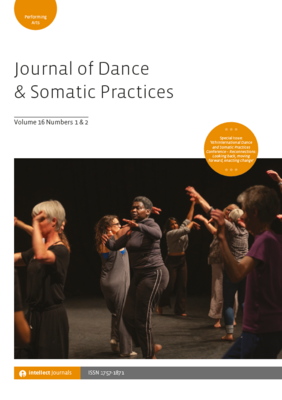
Call for Papers: Special 'Somatic Practises in Brazil' issue: JDSP
Call for Papers: Journal of Dance and Somatic Practises
Special Issue 12.1: Somatic practices in Brazil: perspectives, applications, unfolding
Editors: Ciane Fernandes, Diego Pizarro and Melina Scialom
Deadline for submissions: 1st June 2019
Submit online at: https://callisto.newgen.co/intellect/index.php/JDSP/login/
In 1976, Thomas Hanna’s book, Bodies in Revolt: a Primer in Somatic Thinking, was first translated to Portuguese and published in Brazil. Interestingly enough, somatic practices and philosophy in Brazil can be traced back to the beginning of the 20th century when local artists demonstrated interest in body practices that had a deeper body-mind engagement. It may be that a somatic perspective began to flourish in the country with the arrival of Rudolf Laban’s philosophy in the early 1930’s. Indeed, the Hungarian dancer Maria Duschenes who immigrated to São Paulo in 1940 was a key figure who inspired many to turn their attention back to their bodies. A few decades later, the work of the Brazilian couple Angel and Klauss Vianna became an extremely influential somatic perspective in dance practice and pedagogy, suggesting that a deeper awareness of the body was already growing in the country. However, somatics in Brazil may date even back to the body practices inspired by the activities of the first inhabitants of this land: the tribal indigenous.
Considering this early and also blurred background of the somatics in Brazil, it was only after 1999 that the term – somatic practices – was formally introduced by Euro-American textbooks and papers, and began to be advertised as a mindful practice and an embodied philosophy. In a world particularly colonized by European and North-American perspectives on somatics, it is important to acknowledge other viewpoints on which somatics was and is shaped in different cultures, in a continuous transformation. Indeed, somatics holds the power of transformation and its pathways are moving between becomings.
This issue is an open space for dialogue between local somatic educators, researchers and artists-researchers that have been developing emerging inquiries/compositions within the field of somatics and its interfaces within dance, theatre, performance, education, ecology, science, psychotherapy, sociology, anthropology etc., within and outside of Brazil. Taking into account that an increasing number of active practitioners and researchers are bringing their cultural perspectives to the forefront of their explorations either in universities or different communities, we believe it is important to enhance that range by challenging our colleagues keenly guided by the moving, porous, experiential and performative quality of somatic research.
We will consider themes addressing the following topics in relationship to the Brazilian experience:
- History and unfolding of somatics and bodywork in Brazil, as well as their relationships to the expanded field in the arts
- Somatic practices in/as academic research: somatic ways of creating knowledge; somatic epistemology; reflections upon how different somatic means of teaching and researching launched unique practices and discourses on the extent of education, as well as in performing arts and academic research
- Somatic practices and artistic creative processes, as well as inter-artistic and contemporary performative tendencies, such as performing arts at large, site specific, urban intervention, ecoperformance, etc.
- Somatic practices and body technique for the performing artist in dance, theatre, circus, opera, etc.
- Somatic practices and multiple stage elements and concepts, such as dramaturgy, stage design, costume, lighting, sonority, etc.
- Cultural and performative studies addressing somatics
- Somatic perspectives on diversity, such as gender and ethnicity issues
- Somatics beyond disciplines
- Applied somatic practices with specific groups, such as elderly, pregnant women, children, teenagers, etc., and also groups with special needs and disabilities
- The interconnectivity between Somatics and politics/activism
- Environmental somatics: ecosomatics, sustainability, body and nature
- Somatics in the age of new media/technologies.
Standard articles should be in the range of 4000-6000 words. More playful contributions are welcomed, particularly those that include images, but if a contributor has a particular idea in mind that might deviate from the template they must contact the editors first to discuss the possibilities and prior to submitting a contribution and contributors need to work within the existing journal design template (a free to view issue is available on the Intellect website as illustration). The guidelines for alternative formats can be found at this link https://www.coventry.ac.uk/Global/08%20New%20Research%20Section/C-DaRE/ Guidlines%20for%20JDSP%20alternative%20formats.pdf

